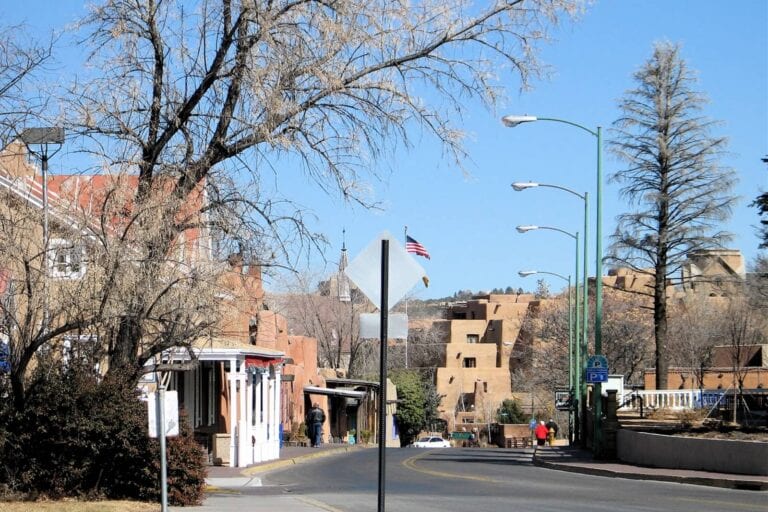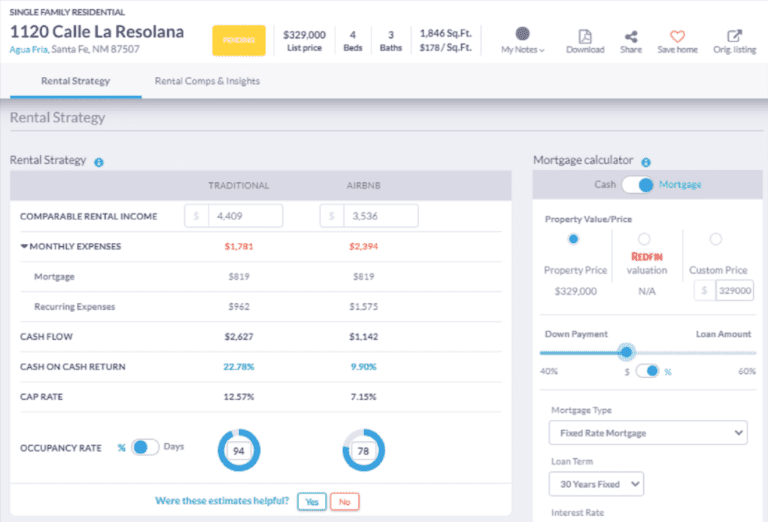There is no doubt that the Coronavirus pandemic has changed the way people work and live. One of the most notable effects of the spread of COVID-19 has been an increased trend of migration from urban to suburban neighborhoods. A recent study by Realtor.com revealed that many Americans have been showing a preference for moving to the best small towns since the lockdowns and stay-at-home orders began. In mid-2020, the year-over-year searches for suburban zip codes increased by 13%, which was almost double the rate of urban areas. According to a report by StratoDem Analytics, net migration to suburban real estate markets in 2020 was about 20 times the rate of net migration to urban areas. This trend of movement to small towns is expected to continue in the US housing market 2021.
But what does this mean for real estate investors? The main takeaway is that small, suburban markets will be heating up and turning into some of the best places to invest in real estate in 2021. This is particularly true when it comes to traditional rental properties.
Related: Suburban Real Estate Market Boom Due to COVID-19
Top Reasons for Migration to Small Cities
1. More Outdoor and Indoor Space
To minimize COVID-19 infections, social distancing has become the new normal in our world. The desire for more space has caused many Americans to leave their small city dwellings for more spacious suburban homes in the best small towns. Living in a larger home with more bathrooms and bedrooms means that you can have more privacy. Having a large outdoor space allows you to enjoy some recreation time while keeping distance between yourself and the neighbors.
2. Remote Work
Traditionally, people have chosen where to live based on where they work. However, with the outbreak of the Coronavirus pandemic, there has been a dramatic shift to remote work. A recent Gallup research revealed that 62% of Americans were working from home due to COVID-19. Even after the pandemic ends, it is expected that a good number of employees will continue working remotely. With the ability to work from any location, many people are choosing to move to the best small towns where properties are more affordable and more spacious.
3. Affordable Real Estate Markets
The cost of living in urban areas is usually very high. For the average American, living in large cities like San Antonio, Phoenix, Chicago, New York, San Diego, and Houston is unbearable. Alternatively, living in the best small towns allows you to access quality amenities at a much lower price. When it comes to real estate properties, you get more value for your money in terms of features and square footage. Other amenities like schools, healthcare, and transport are also usually more affordable in suburban locations.
4. More Peace and Quietness
Generally, city life is very loud. From blaring sirens to honking cars, living in a city doesn’t allow one to have much peace and quiet. For people who are tired of this incessant noise, migrating to the best small towns is a welcome relief. Even suburbs with urban amenities and a vibrant social scene tend to be more peaceful and laid-back than large cities.
Best Small Towns to Invest in Real Estate in 2021
Resonance Consultancy, a renowned advisor in economic development, tourism, and real estate, has recently announced America’s best small cities. The report was focused on top-performing suburban and rural markets with a population ranging between 100,000 and 500,000. This annual ranking is based on factors such as a city’s outdoor activities, diversity, nightlife, and variety of cultural attractions.
In the ongoing reality of the pandemic, migration to these markets is expected to continue, which means that traditional rental demand will go up. Now’s the time for investors to jump on buying a rental property in these towns.
So, here are some of the best small towns for investing in real estate in the US as ranked by Resonance Consultancy. We have selected the markets with the highest traditional cash on cash return based on Mashvisor data.
1. Santa Fe, New Mexico

Santa Fe
- Median Property Price: $693,400
- Price per Square Foot: $323
- Price to Rent Ratio: 22
- Monthly Traditional Rental Income: $2,630
- Traditional Cash on Cash Return: 3.64%
- Walk score: 0
- Days on market: 129
2. Anchorage, Alaska
- Median Property Price: $268,620
- Price per Square Foot: $184
- Price to Rent Ratio: 13
- Monthly Traditional Rental Income: $ 1,720
- Traditional Cash on Cash Return: 4.44%
- Walk score: 38
- Days on market: 23
Related: The Pros and Cons of Investing in a Rural Property
3. Trenton, New Jersey
- Median Property Price: $239,000
- Price per Square Foot: $149
- Price to Rent Ratio: 12
- Monthly Traditional Rental Income: $1,620
- Traditional Cash on Cash Return: 4.16%
- Walk score: 92
- Days on market: 78
4. Napa, California
- Median Property Price: $1,213,600
- Price per Square Foot: $597
- Price to Rent Ratio: 32
- Monthly Traditional Rental Income: $3,140
- Traditional Cash on Cash Return: 2.37%
- Walk score: 20
- Days on market: 82
5. Lansing, Michigan
- Median Property Price: $206,600
- Price per Square Foot: $113
- Price to Rent Ratio: 20
- Monthly Traditional Rental Income: $880
- Traditional Cash on Cash Return: 3.08%
- Walk score: 62
- Days on market: 66
Related: Why Real Estate Investors Might Look to the Suburbs
6. Lincoln, Nebraska
- Median Property Price: $343,300
- Price per Square Foot: $179
- Price to Rent Ratio: 25
- Monthly Traditional Rental Income: $1,170
- Traditional Cash on Cash Return: 1.63%
- Walk score: 38
- Days on market: 103
7. Charlottesville, Virginia
- Median Property Price: $565,600
- Price per Square Foot: $233
- Price to Rent Ratio: 24
- Monthly Traditional Rental Income: $1,950
- Traditional Cash on Cash Return: 2.21%
- Walk score: 69
- Days on market: 115
8. Fort Wayne, Indiana
- Median Property Price: $262,800
- Price per Square Foot: $125
- Price to Rent Ratio: 18
- Monthly Traditional Rental Income: $1,190
- Traditional Cash on Cash Return: 3.46%
- Walk score: 3
- Days on market: 71
9. Fort Collins, Colorado
- Median Property Price: $540,800
- Price per Square Foot: $241
- Price to Rent Ratio: 23
- Monthly Traditional Rental Income: $1,940
- Traditional Cash on Cash Return: 2.30%
- Walk score: 46
- Days on market: 78
10. Reno, Nevada
- Median Property Price: $581,900
- Price per Square Foot: $284
- Price to Rent Ratio: 33
- Monthly Traditional Rental Income: $1,490
- Traditional Cash on Cash Return: 1.52%
- Walk score: 1
- Days on market: 87
How to Buy a Profitable Traditional Rental Property in a Small Town
Knowing the best small cities and what return on investment to expect there is a great first step. However, it’s not enough in order to ensure a profitable, positive cash flow real estate investment. Below we’ve outlined the steps you need to take in order to land a good deal:
Neighborhood Analysis
Once you’ve selected which of these markets is the best for you in terms of home values, rental income, and expected rate of return, you need to conduct detailed neighborhood analysis. The purpose of this analysis is to identify the best areas for buying a traditional rental property within your budget and your investment expectations.
While neighborhood analysis can take weeks of collecting real estate data and rental comps, it can be done in a fast and efficient way with the help of the Mashvisor real estate heatmap. This is one of the must-have real estate investment tools which color-codes neighborhoods based on:
- Listing price
- Traditional rental income
- Traditional cash on cash return
As soon as you’ve been able to identify a few locations which match your general criteria, you can deepen your real estate market analysis with the neighborhood pages available on the Mashvisor platform. There you will find all the detailed data and information which you need to make an educated decision on the best location for your traditional rental property.
Investment Property Analysis
The next step towards buying a rental property that will bring you positive cash flow and above-average return is analyzing the investment potential of real estate listings within your selected neighborhood. Oncce again, Mashvisor’s tools are here to help you. Our rental property calculator will provide you with access to detailed investment property analysis on any property available on our platform as well as any property for which you enter the address. This analysis will include but not be limited to:
- Property price
- Startup costs
- Comparable rental income
- Recurring expenses
- Traditional occupancy rate
- Traditional cash flow
- Traditional cash on cash return
- Traditional cap rate
- Financing options

Mashvisor’s Investment Property Analysis
All in all, using Mashvisor’s real estate investment software will help you turn 3 months of research into 15 minutes when searching for the best opportunities in the small US towns.
Conclusion
When it comes to where to invest in real estate, the options are endless. However, if you’d like to be able to achieve a good return at an affordable price, have a look at suburban markets. Moreover, be sure to do your due diligence before you buy a rental property in these best small towns for investing. Use Mashvisor’s investment property calculator to analyze the profitability potential of small town real estate. This tool will show you what return on investment you can expect in terms of cash flow, cash on cash return, and cap rate.
To get access to our real estate investment tools, sign up for a 7-day free trial of Mashvisor today, followed by 15% off for life.